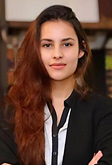University of Tartu, Estonia

I identify myself as a lawyer and a LegalTech enthusiast who graduated from law school with a first class honours. Thereafter, to bolster my knowledge, I pursued a diploma in intellectual property (IP) laws in India, studied various courses offered by WIPO, whilst also interning at several law and governmental offices. My enthusiasm for IP laws was later acknowledged the WIPO-KIPO when I was selected to attend a summer school on IP Laws in South Korea. I am currently reading for a Master’s degree in Information Technology Law with a concentration in Data Protection laws, Artificial Intelligence, Cyber security and ICT litigation at the University of Tartu in Estonia on a merit-based academic scholarship.
Fellow Report:
Reflections on EuroSSIG 2021
The EuroSSIG 2021 edition witnessed fellows coming from diverse regions of the world, lodged in a monastery located in the picturesque medieval town of Meissen in Germany to understand the internet ecosystem better and ignite a change to make the internet equally accessible to all. The enthusiasm of all fellows indeed proves that the internet is the last bastion of equality in the modern society and that needs to be made accessible to all.
The fifteenth year of the EuroSSIG called for a grand celebration which got cancelled owing to the pandemic. However, our time at the monastery and the breathtaking Saxon vineyards in Meissen hardly managed to dampen the spirits of all. The welcome dinner served as an ice breaker for all the fellows to get to know each other better and exchange ideas about what they hoped to gain out of their participation in the EuroSSIG. At the dinner table, Prof. Wolfgang Kleinwächter officially opened the Summer School and briefly spoke about the history of EuroSSIG and why this format was considered to be the most appropriate to spark the debate about internet governance issues. We were apprised of the main themes of the Summer School that perfectly complimented all the pre-event reading materials provided to us.
The following days at the Summer School were filled with interesting discussions about the geo-strategic policies related to internet governance, current developments, technical considerations including cybersecurity, artificial intelligence, standards and protocols, content moderation – all facilitated by eminent professionals from notable organisations like ICANN, RIPE NCC, DENIC. Further, the social aspects of the internet such as the human rights perspective, cybercrimes and privacy of the users were also discussed in detail in a collaborative environment between the fellows and the faculty. There were also discussions surrounding the business perspective on internet governance which is central to the idea of creating a multi-stakeholder environment as the private players play a key role in the defining the standards for internet governance. This discussion was fuelled by the various policy insights from Mr. Robert Pepper, Head Global Connectivity Policy and Planning, Facebook and the equally stimulating corresponding questions posed by the fellows.
The sessions gave enough fodder to every fellow to let the discussions spill over to the breakout sessions and sometimes to even the dinner tables. Discussions surrounding the inclusion of a human rights impact assessment while developing standards by the Standards Developing organisations or the management of TLDs with Avri Doria and Chris Disspain over a glass of fine Saxon wine were surely my key takeaways. At hindsight, I do believe that Prof. Kleinwächter was absolutely right when he said that this is perhaps the best format to learn about internet governance since it presented an opportunity to learn a lot from the faculty and the fellows at such close proximity.
While all the sessions were very informative, as a lawyer working in the domain of artificial intelligence and data protection, the session on the ‘International guidelines on artificial intelligence’ conducted by distinguished members of the European Commission and The Council of Europe was the most interesting and useful for me, especially in light of the recent legislative developments in the European Union. Their outlook on certain issues in response to the various questions posed by the fellows helped me to not only develop a multi-faceted perspective but also reflect the same in my ongoing research paper.
Indeed, ‘the multistakeholder approach’ stood out as the key theme of the EuroSSIG and the organisers also ensured that the Summer School exhibited inclusivity in the feedback session conducted on the last day, whereby each fellow brought on the table different ideas about further discussions required in the internet governance space. One such topic identified for further dialog was – Internet governance and environmental sustainability. I am confident that this topic would be discussed at length in the EuroSSIG 2022 edition and considered as a topic of imminent importance in the agenda of various IGF forums as well.
Overall, the EuroSSIG provided all the fellows with a very thought-provoking and immersive experience and a much-needed respite from the online fatigue, whilst maintaining the highest standards of hygiene during the covid crisis. With that said, we all took back with us multiple insightful conversations with the faculty and the fellows, countless memories made under the starry skies of Meissen, ideas that turned into potential collaborations and an improved discernment of the manifold confusing acronyms in the internet governance ecosystem.
